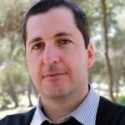01 Dec Scientists Grow Liver Cells In Lab, Paving Way For Artificial Liver

Dr. Nahmias
MedicalResearch.com Interview with:
Prof. Yaakov Nahmias PhD
Director of the Alexander Grass Center for Bioengineering
Hebrew University of Jerusalem
Medical Research: What is the background for this study?
Prof. Nahmias: The liver has a limitless capacity of the human liver to regenerate from even a massive loss of mass.
However, the intrinsic capacity of liver cells to proliferate is lost when cells are removed from the body.
Medical Research: What are the main findings?
Prof. Nahmias: We found that a weak expression of Human Papilloma Virus (HPV) proteins released hepatocytes from cell-cycle arrest and permitted the cells to multiply in response to Oncostatin M (OSM) an immune cytokine recently found to be involved in liver regeneration.
While previous efforts caused hepatocytes to multiply without control, converting hepatocytes into tumor cells with little metabolic ability, we selected colonies that only multiply in response to OSM.
Activation with OSM triggered cell growth with a doubling time of 40 hours. Removal of OSM caused growth to stop, allowing the cells to regain a high level of metabolic activity within 4 days.
We produced hepatocytes from ethnically diverse individuals. Importantly, the growing hepatocytes showed a similar toxicology response to normal human hepatocytes across 23 different drugs.
Medical Research: What should clinicians and patients take away from your report?
Prof. Nahmias: Medical researchers that are interested in the study of liver disease can now do experiments on functional human liver cells at a fraction of the current cost. There is no more need to use isolated mouse or rat hepatocytes for the study of liver disease, although whole animal models are here to stay.
We also enable the study of patient-to-patient variability, enabling a deeper understanding of idiosyncratic toxicity and genetic differences in drug efficacy. This is a unique tool for personalized medicine.
Finally, the bio-artifical liver project which aims to create extracorporeal support as a bridge for transplantation (e.g. kidney dialysis) had no reliable cell source for the last few decades. We strongly believe our cells bring the bio-artificial liver within reach.
Medical Research: What recommendations do you have for future research as a result of this study?
Prof. Nahmias: We are currently developing our cells for the study of fatty liver disease and pathogen lifecycle.
We are looking for industrial partners that wish to drive the development of other projects.
Citation:
Gahl Levy, David Bomze, Stefan Heinz, Sarada Devi Ramachandran, Astrid Noerenberg, Merav Cohen, Oren Shibolet, Ella Sklan, Joris Braspenning, Yaakov Nahmias. Long-term culture and expansion of primary human hepatocytes. Nature Biotechnology, 2015; DOI:10.1038/nbt.3377
[wysija_form id=”5″]
Prof. Yaakov Nahmias PhD (2015). Scientists Grow Liver Cells In Lab, Paving Way For Artificial Liver
Last Updated on December 1, 2015 by Marie Benz MD FAAD
